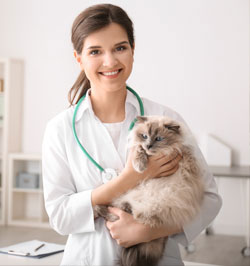What You Need to Know Before Your Pet's Upcoming Surgery
 Many people have questions about various aspects of their pet's surgery, and we hope this information will help. It also explains the decisions you will need to make before your pet's upcoming surgery. Many people have questions about various aspects of their pet's surgery, and we hope this information will help. It also explains the decisions you will need to make before your pet's upcoming surgery.
Is the anesthetic safe?
Here at Wandermere Animal Hospital, we do a thorough physical exam on your pet before administering anesthetics, to ensure that a fever or other illness won't be a problem. We also adjust the amount and type of anesthetic used depending on the health and breed of your pet. Finally we utilize both a dedicated staff member monitoring your pet while under anesthesia and state of the art monitors that measure your pet's blood pressure, SPO2, temperature, ETCO2, and EKG. Your pet will also have an IV catheter placed so that we can administer fluids to your pet while under anesthesia.
Preanesthetic blood testing is also important in reducing the risk of anesthesia. We recommend that every pet have their blood tested before surgery to ensure that the liver and kidneys can handle the anesthetic. Even apparently healthy animals can have serious organ system problems that cannot be detected without blood testing. If there is a problem, it is much better to find it before it causes anesthetic or surgical complications. If serious problems are detected, surgery can be postponed until the problem is corrected.
It is important that surgery be done on an empty stomach to reduce the risk of vomiting during and after anesthesia. You will need to withhold food for at least 8 hours before surgery. Water can be left down for the pet until the morning of surgery.
Will my pet have stitches?
For many surgeries, we use absorbable sutures underneath the skin. These will dissolve on their own, and do not need to be removed later. Some surgeries, especially tumor removals, do require skin stitches. With either type of suture, you will need to keep an eye on the incision for swelling or discharge. Some dogs and cats will lick excessively or chew at the incision so this is an occasional problem you will also need to watch for. If there are skin sutures, these will usually be removed 10 to 14 days after surgery. You will also need to limit your pet's activity level for a time and no baths are allowed for 14 days after surgery.
Will my pet be in pain?
Anything that causes pain in people can be expected to cause pain in animals. Pets may not show the same symptoms of pain as people do; they usually don't whine or cry, but you can be sure they feel it. Pain medications needed will depend on the surgery performed. Major procedures require more pain relief than things like minor lacerations.
For dogs & cats, we may recommend an oral anti-inflammatory the day of surgery and several days after to lessen the risk of discomfort and swelling.
Recent advances in pain medications have allowed for better pain control in cats & dogs than ever before. We administer a pain injection prior to surgery. We typically give an additional pain injection after surgery. In most cases we will then send home 3-5 days worth of oral pain and anti-inflammatory medication.
What other decisions do I need to make?
While your pet is under anesthesia, it is the ideal time to perform other minor procedures, such as small growth removals, ear cleaning, or implanting an identification microchip. If you would like an estimate for these extra services, please call ahead of time. This is especially important if the person dropping the pet off for surgery is not the primary decision maker for the pet's care.
When you bring your pet in for surgery, we will have you meet with the surgeon for a short time to fill out paperwork and make decisions on other options available. When you pick up your pet after surgery you can also plan to spend about 10 minutes to go over your pet's home care needs with one of our staff.
We will call you the night before your scheduled surgery appointment, to confirm the time you will be dropping your pet off and to answer any questions you might have. In the meantime, please don't hesitate to call us with any questions about your pet's health or surgery.
| 
 Many people have questions about various aspects of their pet's surgery, and we hope this information will help. It also explains the decisions you will need to make before your pet's upcoming surgery.
Many people have questions about various aspects of their pet's surgery, and we hope this information will help. It also explains the decisions you will need to make before your pet's upcoming surgery.